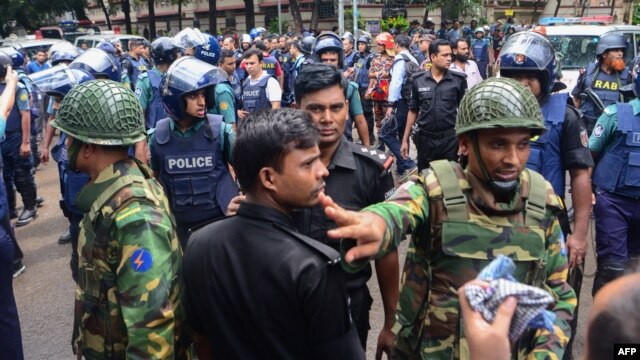Bangladesh says Dhaka attackers not from Islamic State group
| Publisher | Radio Free Europe/Radio Liberty |
| Publication Date | 3 July 2016 |
| Cite as | Radio Free Europe/Radio Liberty, Bangladesh says Dhaka attackers not from Islamic State group, 3 July 2016, available at: https://www.refworld.org/docid/57a43c3d25.html [accessed 18 May 2023] |
| Disclaimer | This is not a UNHCR publication. UNHCR is not responsible for, nor does it necessarily endorse, its content. Any views expressed are solely those of the author or publisher and do not necessarily reflect those of UNHCR, the United Nations or its Member States. |
July 03, 2016
By RFE/RL
 Bangladeshi police and military gather in an intersection near an upscale restaurant after a bloody siege ended in Dhaka on July 2.
Bangladeshi police and military gather in an intersection near an upscale restaurant after a bloody siege ended in Dhaka on July 2.
Bangladesh says that the gunmen who killed 20 foreigners at a Dhaka restaurant were members of a homegrown Bangladeshi militant group and not followers of the Islamic State (IS) organization.
Home Minister Asaduzzaman Khan said on July 3 that "they are members of the Jamaat-ul-Mujahedin Bangladesh," referring to a group which has been banned in Bangladesh for more than a decade. He added that they "have no connections with the Islamic State."
IS has taken credit for the killing of the foreigners and two police officers during an 11-hour hostage crisis that ended on July 2. The government has consistently denied that international extremist groups are operating in Bangladesh but says that Jamaat-ul-Mujahedin Bangladesh claims it represents the IS terrorist organization.
Police have released the names and photos of six of the attackers who were shot at the end of the siege. A seventh was arrested and is being interrogated by Bangladeshi intelligence officers.
Police said nine Italians, seven Japanese, two Bangladeshis, an Indian, and a U.S. citizen were killed during the attack.
Thirteen survivors were also rescued at the end of the siege after as many as 100 police commandos backed by seven armored vehicles stormed the restaurant in Dhaka's diplomatic quarter.
Three of those who were rescued were foreigners, including one Japanese and two Sri Lankans.
The United Nations Security Council has condemned the attack. The council late on July 2 said terrorism "constitutes one of the most serious threats to international peace and security."
Bangladesh has seen a spike in militant violence in the last 18 months. Previous attacks have tended to be against individuals, often using machetes, targeting liberals or members of minority groups.
The government has blamed two homegrown groups for the previous killings: Jamaat-ul-Mujahedin and Ansar al-Islam, which pledges allegiance to Al-Qaeda.
The raid on the restaurant was a rare instance of a more coordinated operation.
In the attack, gunmen singled out foreigners as soon as they stormed through the doors of the restaurant.
They ordered all Bangladeshis to stand up before the killing began, and then to close their eyes and recite verses from the Koran.
The militants hacked most of their foreign victims to death with machetes.
It was not clear if the attackers had made any demands during the hostage standoff.
With reporting by Reuters, AP, and AFP
Link to original story on RFE/RL website
